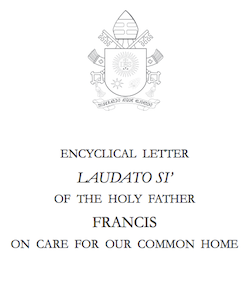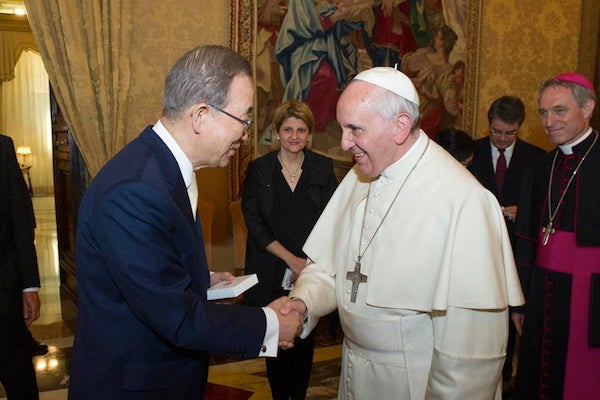This article was published in Scientific American’s former blog network and reflects the views of the author, not necessarily those of Scientific American
Religion and science are at best strange bedfellows, as the Catholic Church has found since the time of its unfortunate experience with Galileo. So it is significant that Pope Francis, who has shown great appetite for departing from some of the harsh rhetoric and methods of his predecessors, is issuing an encyclical on the environment at a time when the world’s leaders are once again considering a global approach to dealing with climate change.
Whenever religious figures enter into a debate on policy issues that have a strong scientific basis there is a slippery interplay between the desire to do good by addressing real problems, and the constraints that ideology and dogma impose upon the ability to do so objectively. Pope Francis’s encyclical follows this pattern.

On supporting science journalism
If you're enjoying this article, consider supporting our award-winning journalism by subscribing. By purchasing a subscription you are helping to ensure the future of impactful stories about the discoveries and ideas shaping our world today.
Laden with detail, it is perhaps the most scientific document to come out of the Vatican since John Paul II discussed evolution in 1996. As a result, many in the environmental community have praised the encyclical, which affirms that human activity causes climate change and delineates many of the impacts, especially the disproportionate impact it is likely to have on the world’s poor. While calling on people of all religions to take action, however, the pope rejects, on a purely theological basis, some of the most propitious solutions on the table.
The evidence-based discussion of climate change in the encyclical resulted in part from prolonged interaction with the scientific community. The language in many places reads like a treatise from the Intergovernmental Panel on Climate Change (IPCC). Consider, for example, this excerpt:
There is a very consistent scientific consensus indicating that we are in the presence of a disturbing heating of the climate system. In recent decades, this warming was accompanied by the constant rising of the sea level, and it is also hard not to relate it with the rise in extreme weather events... It is true that there are other factors (such as volcanism, the changes in the orbit and the axis of the Earth, the solar cycle), but numerous scientific studies indicate that most of the global warming in recent decades it is due to the large concentration of greenhouse gases (carbon dioxide, methane, nitrogen oxide and others) mainly emitted due to human activity. Their concentration in the atmosphere prevents the heat of the solar rays reflected from the Earth to be dispersed in space. This is especially enhanced by the model of development based on the intensive use of fossil fuels, which is at the center of the global energy system. It is also affected by the increase of the practice of changing land use, mainly by deforestation for agricultural purposes.
The synopsis of the impacts of climate change is equally empirical:
… the heating has effects on the carbon cycle. It creates a vicious cycle which aggravates the situation even more and which will affect the availability of essential resources like drinking water, energy and agricultural production in the hottest areas, and will result in the extinction of a part of the planet’s biodiversity. The melting of polar and high altitude ice threaten the leakage of methane gas which carries high risks, and the decomposition of frozen organic matter could further accentuate the emission of carbon dioxide. In turn, the loss of tropical forests makes things worse, since these help to mitigate the climate change. The pollution produced by carbon dioxide increases the acidity of the oceans and affects the marine food chain.
Perhaps of most importance to the Pope himself, who has always expressed solidarity with the poor, the document makes it clear that the impacts of climate change are disproportionate, with the poorest countries likely to bear the largest burden. It castigates climate-change deniers in wealthy nations who “seem to focus especially on masking the problems or hiding the symptoms”.
These are timely and welcome remarks by someone who is viewed as a spiritual guide by billions of Catholics. An encyclical wouldn’t be an encyclical without theology however, and that is where problems arise. In a chapter entitled “Gospel of Creation” Francis ruminates poetically on the nature of man, the mystery of the cosmos (my own area of study) and the special duty Christians have to respect nature, humanity and the environment. It’s beautifully presented and sounds good in principle. However, his biblical analysis leads to the false conclusion that contraception and population control are not appropriate strategies to help a planet with limited resources.

Pope Francis receives U.N. Secretary General Ban Ki-moon at the Vatican in May 2014, where Ban commended Francis's commitment to eradicating poverty and promoting sustainable development. (Photo by United Nations/Eskinder Debebe)
Here, ideology subsumes empiricism, and the inevitable conflict between science and religion comes to the fore. One can argue until one is blue in the face that God has a preordained plan for every zygote, but the simple fact is that if one is seriously worried about the environment on a global scale population is a problem. A population of 10 billion by 2050 will likely be unsustainable at a level in which all humans have adequate food, water, medicine and security. Moreover, as this pope should particularly appreciate, the environmental problems that overpopulation creates also disproportionately afflict those in poor countries, where access to birth control and abortion is often limited. Ultimately, the surest road out of poverty is to empower women to control their own fertility. Doing so allows them to better provide for themselves and their children, improves access to education and healthcare and, eventually, creates incentives for environmental sustainability.
The problem with basing a public policy framework on outmoded ideas that predate modern science and medicine is that one inevitably proposes bad policies.
No one can fault Pope Francis’s intentions, which are clearly praiseworthy, but his call for action on climate change is compromised by his adherence to doctrines that are based on revelation and not evidence. The Catholic Church and its leaders can never be truly objective and useful arbiters of human behavior until they are willing to dispense with doctrine that can thwart real progress. In this sense, the latest encyclical took several steps forward, and then a leap back.